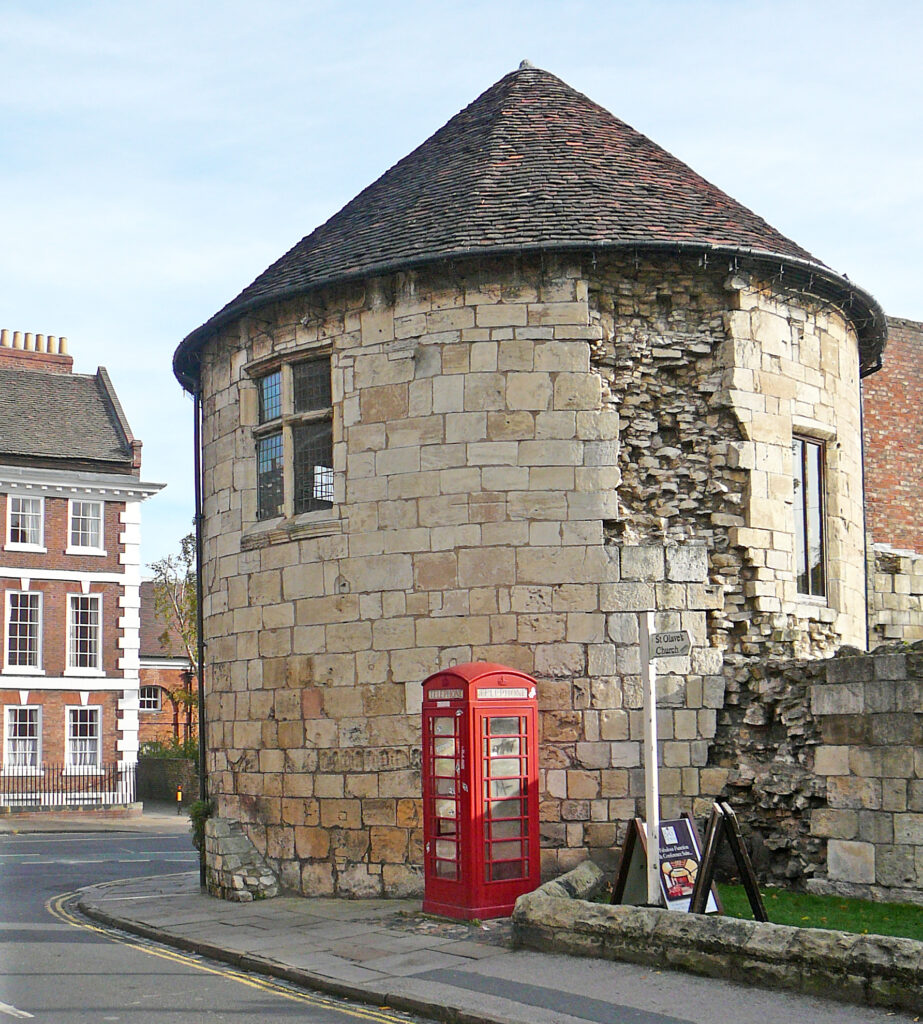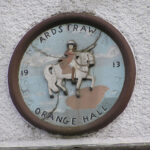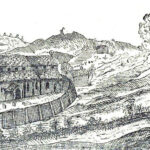16 June 1644: On Trinity Sunday, Parliament and the Scots breach York’s walls and destroy monastic records with a mine next to St Mary’s Tower

Damage on St Mary’s Tower from the 1644 mine (Green 2010).
Henry Slingsby and Daniel Parsons. 1836. The Diary of Sir Henry Slingsby of Scriven, Baronet. London: Longman, Rees, Orme, Brown, Green, and Longman. Get it:
.Unedited excerpt
If an excerpt is used in the book, it will be shorter, edited and, where applicable, translated.
When the enemy had thus besieged us, he began to make his approaches, and raised a battery upon the Windmill Hill, as the way lies to Heslington; plants upon it five pieces of cannon and plays continually into the town, they come nearer to us and takes the suburbs without Waingate [Walmgate] Bar, plants two pieces in the street against the bar, another at the Dovecoat within a stone’s cast of the bar; then he works under ground close by the bar, and makes his mines in two several places; likewise Manchester, who had his quarters about Clifton and Huworth, was not less active, but makes his approaches, works his mines under St. Mary’s Tower without Bootham Bar, and raised a battery against the manor wall that lied to the orchard; he begins to play with his cannon and throws down piece of the wall. We fall to work and make it up with earth and sods; this happened in the morning: at noon they spring the mine under St. Mary’s Tower, and blows up one part of it, which falling outwards made the access more easy; then some at the breach, some with ladders, gets up and enters, near 500.
Sir Philip Biron that had the guard at the place, leading up some men was unfortunately killed as he opened the doors into the bowling green whither the enemy was gotten; but the difficulty was not much, we soon beat them out again, having taken 200 prisoners and killed many of them, as might be seen in the bowling green, orchard and garden; the Scots were all the while busy about the mine, and we as busy in countermining, but at length both give over being hindered by water; they had beaten down the top of the bar as low as the gate, which we had barricaded up with earth, and besides had made a traverse against it, and pulled down some houses near the gate: sallies we made few or none, having only Middlegate [Micklegate] Bar open, and a little sally port at Monk Bar, where we once made a sally out against Manchester’s men. Our horse guards would be pikering [pickering, robbing corpses?], and now and then killing, and taking of the Scots, and among them one Bellintine, a major, whom they made great moan for; some redoubts they took by storm, as one in Bishopfields, and another on a windmill hill towards Bishopthorpe. But this was no great loss more than the killing of the men; for but one they kept, the other they slighted, and we still send to the fields to keep our cows and horses: but our provisions still wasted and would have an end without we had relief.
Trinity Sunday is on 31 May 2026.
Comment
Comment
A Parliamentary report on the following day:
On Monday morning, some of our soldiers betwixt nine and ten a clock, approaching towards the place where the tower stood, heard in the rubbish a very doleful cry, some calling, Help, help; others Water, water. Their lamentable complaints moved our men to resolve their relief: so they digged one out dead in the rubbish and brought two alive; but from the town, such fierce opposition was made by the merciless enemy against our soldiers while they were labouring to save their friends’ lives, that they were compelled to leave many poor distressed ones dying in the dust. Upon Wednesday or Thursday we obtained an hour’s time to bury our dead (Ashe 1644).
Something to say? Get in touch
Similar
 2 July 1644: Henry Slingsby of the Royalist York garrison recounts Prince Rupert’s defeat at Marston Moor today, which ends Charles I’s hopes in the north
2 July 1644: Henry Slingsby of the Royalist York garrison recounts Prince Rupert’s defeat at Marston Moor today, which ends Charles I’s hopes in the north 3 January 1638: On the eve of the civil war, Henry Slingsby witnesses Royalist cavalry exercising near Wetherby on Bramham Moor, scene of the defeat of the Percy Rebellion in 1408
3 January 1638: On the eve of the civil war, Henry Slingsby witnesses Royalist cavalry exercising near Wetherby on Bramham Moor, scene of the defeat of the Percy Rebellion in 1408 23 January 1643: Thomas Fairfax, the Rider of the White Horse, captures Leeds from the Beast with the help of Psalm 68
23 January 1643: Thomas Fairfax, the Rider of the White Horse, captures Leeds from the Beast with the help of Psalm 68 23 April 1642: Having promised parliament to safeguard for it Hull’s crucial arsenal, John Hotham tells it how today he shut the gates of Hull to Charles I
23 April 1642: Having promised parliament to safeguard for it Hull’s crucial arsenal, John Hotham tells it how today he shut the gates of Hull to Charles I
Comment
Comment
Via, which has a nice map.
Something to say? Get in touch
Search
Donate
Music & books
Place-People-Play: Childcare (and the Kazookestra) on the Headingley/Weetwood borders next to Meanwood Park.
Music from and about Yorkshire by Leeds's Singing Organ-Grinder.



 Bluesky
Bluesky Extwitter
Extwitter